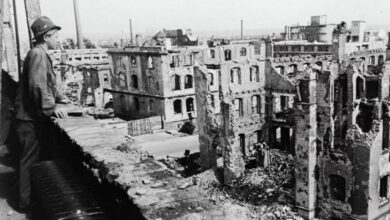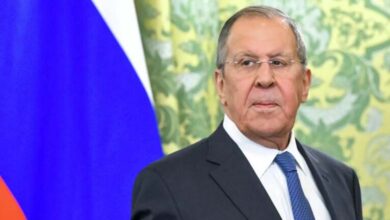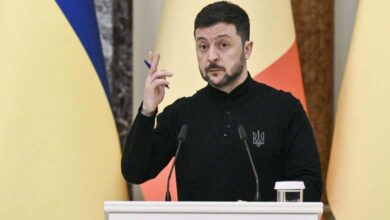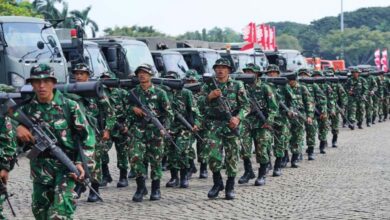Trump announces destruction of Iran’s nuclear capabilities in a series of US strikes
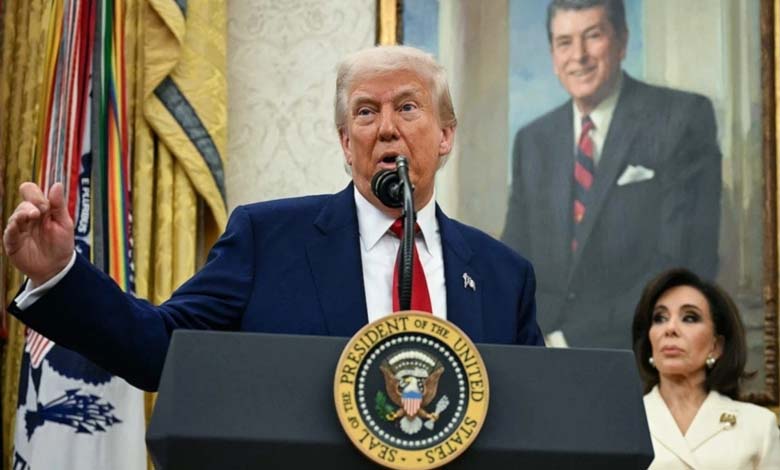
Iran’s Atomic Energy Organization says the US attacks “will not stop” its nuclear activities.
US President Donald Trump confirmed that Iran’s nuclear enrichment facilities in Tehran were “completely destroyed” following a series of US airstrikes on Sunday, the tenth day of the war between Iran and Israel, warning the Islamic Republic against retaliation.
-
Trump and Iran: 4 Possible Scenarios, Including “Shock and Awe”
-
Energy Investments: Iran’s New Card to Woo Trump and End Sanctions
In response to the unprecedented American strikes that targeted three key facilities, Iranian Foreign Minister Abbas Araghchi warned that the attack would have “lasting consequences,” stating that Tehran retained “all options to defend its sovereignty, interests, and people.”
On Sunday morning, Iran launched two waves of missiles toward Israel, injuring at least 11 people, according to Israeli emergency services, and causing extensive damage in the country’s center.
-
Trump’s Pressure Pushes Iran to Accept U.S. Demands on Nuclear File
-
Iran’s Nuclear Program Back in the Spotlight… and Trump Seeks Political Breakthrough
Iran’s armed forces said they had targeted several locations in Israel, including Ben Gurion Airport. Fars News Agency quoted a military statement: “The twentieth wave of the True Promise 3 operation has begun, using a mix of long-range missiles powered by both liquid and solid fuel and equipped with destructive warheads.” The targets included the airport near Tel Aviv, a “biological research center,” logistical bases, and command and control centers.
Sirens were heard in Tel Aviv and Jerusalem, followed by loud explosions. Israeli public television showed images of widespread damage in central Israel, where 11 people were reportedly injured.
-
Between Escalation and De-escalation: How Will Trump Handle Iran?
-
Trump’s Return Pushes European Powers to Demand Increased Pressure on Iran
In a brief speech, after days of ambiguity over a possible US intervention in support of Israel, Trump declared: “Iran’s key nuclear enrichment facilities have been totally and completely destroyed. Bullying Iran in the Middle East must now make peace.”
Surrounded by Vice President J.D. Vance, Defense Secretary Pete Hegseth, and Secretary of State Marco Rubio, Trump added: “If they don’t, future strikes will be bigger and much easier.”
Earlier, Trump had announced that the United States had carried out a “very successful” strike on three Iranian nuclear sites.
-
Iran Keeps Door Open for Dialogue with Trump and Prepares for New Sanctions
-
Mutual escalation between Iran and Israel despite calls for de-escalation
On Truth Social, Trump stated that “a full load of bombs” had been dropped on the underground Fordow facility, a central site in Iran’s nuclear program. The two other sites were Natanz, the most well-known enrichment site, and Isfahan, which houses a uranium conversion facility.
Iranian media confirmed the attacks. Morteza Heidari, spokesperson for crisis management in Qom Province, told Tasnim News Agency: “A few hours ago, part of the Fordow nuclear site was hit by a hostile airstrike.”
The International Atomic Energy Agency reported that it had not received any notifications of “elevated radiation levels” following the US strikes.
-
Trump announces destruction of Iran’s nuclear capabilities in a series of US strikes
-
Israel-Iran War Enters Second Week: Firepower Overtakes Dialogue
Iran’s National Center for Nuclear Safety, affiliated with the Atomic Energy Organization, also confirmed that it had detected no “signs of contamination” at the targeted sites, assuring there was “no danger” to nearby residents.
Likewise, Saudi Arabia’s nuclear and radiological regulatory authority reported no “radioactive traces” in the kingdom or other Gulf countries. The Kuwaiti National Guard said in a statement on platform X that no increase in radiation had been observed in Kuwaiti air or waters following the US attacks on Iran.
Israeli Prime Minister Benjamin Netanyahu congratulated Trump in a video message, calling the strike “fully coordinated” with Israel. He said: “Your bold decision to strike Iran’s nuclear facilities with the immense and just force of the United States will change history.”
-
Russia Warns Against Using Tactical Nuclear Weapons to Strike Iran’s Fordo Facility
-
US Strike on Iran Closer Than Ever
-
Iran Tests Trump’s Principles—Will He Fall Into the Trap His Predecessors Warned Against?
Araghchi condemned what he called a “grave violation of the UN Charter, international law, and the Non-Proliferation Treaty” by the United States in attacking Iran’s peaceful nuclear facilities, stating that “this morning’s events are appalling and will have lasting consequences.”
Iran’s Atomic Energy Organization reiterated that the US strikes “will not stop” the country’s nuclear activities.
Experts widely agree that only the United States has the capability to destroy Iran’s nuclear facilities built deep in mountains, like the one in Fordow.
-
Hypersonic Missiles and Strikes on Nuclear Facilities: Day Six Between Iran and Israel
-
Iran’s Fordow… a secret beneath the mountain impervious even to the most powerful bombs
American media, citing anonymous sources, reported that B-2 bombers departed from a base in the US during the night to participate in the attack.
On Friday, Trump had said he would give Iran a “maximum” of two weeks to avoid potential US strikes, but ultimately chose to enter the war alongside ally Israel, based on Israeli claims that Iran was “weeks” or “months” away from obtaining a nuclear weapon.
Before the recent strikes, Washington had limited its support to defensive aid for Israel against Iranian missiles.
-
Iran-Israel Escalation: Mass Launch of Evacuation and Withdrawal Phases
-
Trump Pulls the Trigger Back: Why Did He Reject Israel’s Proposal to Assassinate Khamenei?
Following the US strike, Israel closed its airspace and raised the alert level across the country, allowing only so-called essential activities until further notice.
Meanwhile, Iranian judicial authorities announced on Sunday the execution of a man convicted of spying for Israel’s Mossad. Several people suspected of spying for Israel had been arrested by Iranian authorities following the June 13 attack.
Iran’s foreign minister visited Istanbul on Saturday to attend a meeting of the Organization of Islamic Cooperation to discuss the conflict.
-
Iran and Israel: Cross-Strikes… Is There Still a Window for Nuclear Negotiations?
-
Israel’s Strikes on Iranian Nuclear Facilities: Conflicting Assessments and Unclear Outcomes
The foreign ministers of the United Kingdom, France, and Germany met with Abbas Araghchi in Geneva on Friday, urging him to resume nuclear talks with the United States, which had been suspended since the start of the war.
Hamas condemned the “brutal aggression” against Iran, holding both Washington and Israel fully responsible for its serious consequences. The political bureau of Yemen’s Houthi movement, Ansar Allah, also denounced “the cowardly and savage American aggression targeting the Islamic Republic of Iran and its nuclear facilities.”
In a statement, the Houthis declared that the attack constituted “a blatant act of aggression against a sovereign state, a flagrant violation of all international laws and conventions, a dangerous escalation, and a direct threat to regional and international peace and security.”
-
Israel and Iran: Everything You Need to Know About The Fire Saturday
-
Israel Launches Massive Strike on Nuclear and Missile Facilities in Iran
On the eve of the American strikes, the Houthis had threatened to target US ships in the Red Sea should Washington intervene alongside Israel.
Iraq also condemned the US strikes on Sunday, warning that the escalation posed “a serious threat to peace and security” in the region and “exposed regional stability to grave risks.”
In a statement, government spokesman Bassem Al-Awadi said: “Iraq insists that military solutions cannot be a substitute for dialogue and diplomacy, and that continuing these attacks will lead to a dangerous escalation with consequences that extend beyond the borders of any one country, affecting the stability of the region and the world.”
-
Nuclear Talks – Iran Announces Withdrawal from Sixth Round
-
Operation Rising Lion – How Israel Deceived Iran
UN Secretary-General António Guterres called the US strikes “a dangerous escalation in a region on the edge of the abyss.”
In a statement, he said: “At this critical moment, it is essential to avoid a spiral of chaos,” adding: “There is no military solution. The only path forward is diplomacy. The only hope lies in peace.”
World leaders reacted in contrasting ways to the US bombing of Iranian nuclear sites — Israel welcomed President Donald Trump’s decision, while the United Nations called for de-escalation, and Iran along with other nations condemned the strikes.
-
Is an Attack Imminent? US Newspaper Reveals Israeli and Iranian Preparations
-
Trump Doubts.. Iran Threatens: Is the Nuclear Deal Doomed Before It Begins?
New Zealand’s Foreign Minister Winston Peters said in a statement: “We are aware of the developments in the past 24 hours, including President Trump’s announcement of US airstrikes on nuclear facilities in Iran. The ongoing military actions in the Middle East are extremely concerning, and it is important to avoid further escalation.”
The Australian government spokesperson stated: “We have been clear that Iran’s nuclear program and its ballistic missile program pose a threat to international peace and security. We noted the US president’s statement that it is now time for peace. The security situation in the region is highly volatile. We continue to call for de-escalation, dialogue, and diplomacy.”
The statement added: “The ministry urgently calls for diplomatic dialogue for peace between the parties involved in the Middle East conflict.”
-
CENTCOM Commander Reveals Ready-Made Plans to Strike Iran
-
Iran Reveals Nuclear Target Bank Inside Israel
A NATO official told Reuters on Sunday that the alliance was closely monitoring the situation after President Trump announced that US forces had bombed Iran’s three main nuclear facilities.
Venezuelan Foreign Minister Yván Gil said via Telegram: “Venezuela condemns the US military aggression against Iran and demands the immediate cessation of hostilities. The Bolivarian Republic of Venezuela firmly and categorically condemns the bombing by the United States military, at the request of the State of Israel, against Iranian nuclear facilities, including the sites of Fordow, Natanz, and Isfahan.”
-
Nuclear Talks: Iran Rejects Washington’s Proposal, Prepares Alternative Offer
-
Between Washington and Tel Aviv… Is UNIFIL nearing the end of its mission in Lebanon?
-
Nuclear Talks: Iran Rejects Washington’s Proposal and Prepares an Alternative





